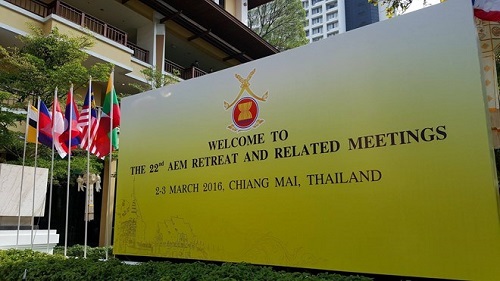ASEAN to reinforce regional, inter-regional economic connectivity
The 22nd ASEAN Economic Ministers’ (AEM) Retreat wrapped up in Thailand’s Chiang Mai province on late March 3, agreeing on ways to boost the regional and inter-regional economic connectivity.
At the one-day meeting, ASEAN economic ministers and officials discussed enhancing the implementation of the ASEAN Vision 2025, especially the ASEAN Economic Community (AEC) Blueprint.
The ministers announced that among the 611 measures contained in the AEC Blueprint, ASEAN has implemented 475, and 106 others have to be carried out in 2016. They agreed to direct ASEAN economic officials to summon internal resources for realising the rest of the blueprint.
 |
| The 22nd AEM Retreat and related meetings took place in Chiang Mai on March 2 - 3 |
Regarding the ASEAN Vision 2025, the ministers set up a priority that their ministries and sectors must focus on designing action plans so that economic ministers can approve them at the ASEAN Economic Ministers’ Meeting this August.
They also welcomed proposals about the bloc’s economic cooperation in 2016 and in following years submitted by Laos, which holds the ASEAN Chairmanship for 2016. They said those suggestions are practical actions that will support development and narrow the development gap in the region.
At the AEM Retreat 22, the participants also mulled over measures to speed up negotiations on the establishment of the Regional Comprehensive Economic Partnership (RCEP) in 2016 as well as talks on the free trade agreements with ASEAN’s partners.
To help ASEAN, especially Laos, bolster negotiation, Viet Nam will consider hosting an official negotiation session in August, the Vietnamese representative said.
With regard to the RCEP’s importance, ASEAN Secretary-General Le Luong Minh said once it is formed, the RCEP will create the world’s biggest free trade market that will account for half of the global population (3.3 billion), over 30 percent of global GDP, and 40 percent of the world’s trade value.
Together with the AEC, the RCEP will generate numerous opportunities for not only trade and investment but also comprehensive economic cooperation between ASEAN nations and the bloc’s regional partners like Japan, China, the Republic of Korea, New Zealand and Australia, he added.
As some ASEAN members had shown their interest in the Trans-Pacific Partnership (TPP), the AEM Retreat 22 spent time appraising the regional countries’ prospects when joining in the TPP, as well as the possible impacts on the AEC their participation in TPP might have.
The ministers agreed to increase discussions among the ASEAN nations about the TPP’s content so that they can have an insight into the pact. They added that ASEAN will narrow the gap between its existing and RCEP standards and norms, and those in the TPP, looking towards the foundation of an Asia-Pacific economic partnership.
At the retreat, the ministers also looked into two initiatives raised by US President Barack Obama at the recent ASEAN – US Summit in Sunnylands. The initiatives are to set up centres in Jakarta, Singapore and Bangkok to foster the ASEAN and US markets’ connectivity, and holding ASEAN – US trade workshops.
Also on March 3, the ASEAN economic ministers and EU Commissioner for Trade Cecilia Malmstrom had a consultation during which the Southeast Asian officials expressed their hope that the EU will continue supporting the realisation of the ASEAN Vision 2025.
The two sides renewed the pledge to strengthen economic cooperation between the two regions. Particularly, they reiterated collaboration towards an ASEAN – EU free trade agreement.
At the consultation, Viet Nam, as the coordinator of the ASEAN – EU economic relationship, reported on the implementation of the two sides’ 2015 – 2016 trade and investment agenda.
Both sides have implemented activities in all cooperation areas, making strong improvements in bilateral trade and investment. In 2015, their trade reached 219 billion USD while the EU’s direct investment in ASEAN was 29.3 billion USD, accounting for 21.5 percent of the total foreign direct investment in ASEAN. The EU continued to be the second biggest trade partner and the biggest foreign direct investor in the grouping.
(Source: VNA)